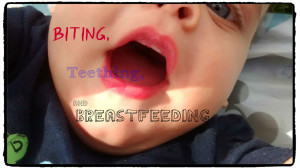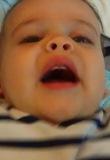So I thought I could see a new tooth coming in on the top, an “upper central incisor”. This would be the next tooth to come in after his lower front teeth according to tooth order information. However, yesterday it looked like, again, he decided to be efficient and grow two at the same time. And yes, indeed there is another upper central incisor coming in. So now we will have a scary mouth of upper and lower front teeth. Scary for me as I am the one feeding him. He has bitten me twice; I had already thought in advance what I was going to do if he bit me. I decided to yell and express that it hurt as soon as he bit me, to take him off, look at him and say “biting hurts mummy” – see this post on behavioural psychology and explanation of reinforcement and punishers for why – in a nutshell, I wanted to give immediate feedback and a consequence to the biting, and to show that it had an impact. He cried and I cuddled him.
Here’s a brief recap on punishment and reinforcement:
- “Punishment” doesn’t necessarily mean there is a harmful or dangerous consequence, it’s a process where a consequence immediately follows a behaviour which decreases the future likelihood of that behaviour occurring. Positive punishment is where a negative consequence is put in place after the behaviour, like sending child to “time out” or telling them off, and negative punishment where a good thing or desired outcome is removed after the behaviour occurs, such as removing cake/sweets.
- Reinforcement is where behaviour increases. Positive reinforcement is where a behaviour increases because it’s followed by a positive/motivating consequence. Negative reinforcement is where behaviour increases because a negative consequence is removed, such as a kid does his chores (behaviour) to avoid being nagged to do it (negative).
So I suppose expressing my discomfort would be a positive punisher? I don’t know if it was the “right” thing to do but I don’t want to be bitten and in fear at every feed. It seemed to work and there was no biting again for a few weeks, then he bit slightly a few days ago, so I did the same thing. I don’t know if that was because he had a new tooth coming in and he was experimenting, or what.
Also, the Little Lovely (LL) appears to be teething a bit earlier than average; first teeth might not come in until between 5 and 7 months, according to this page on teething from the NHS, and upper central incisors at 6 to 8 months. LL was about 4.5 months when his first teeth came in so maybe his younger age impacts on biting and feeding issues? I don’t really know, I’m just thinking out loud.
What I noticed each time, however, is that he was not really eating and had probably finished. It feels like sometimes, toward the end of the feed he is just “mucking around” a bit. I can tell this by playing with his hand or kissing on his arm. If he has finished eating then he will giggle a bit and smile – if he is proper eating and seriously concentrating on that, he does not react to this playing so I leave him to get on with eating. So, maybe he was just experimenting with his new teeth. I will need to retrospectively complete a behavioural analysis on the situation if he does it again! Indeed, from from having a quick search online babies are more likely to bite if they are full, and teething can also impact on biting. So looking at contextual factors in considering why baby bites might be helpful because LL was teething when he bit a few days ago because the other top front tooth was probably about to break through.
Here are some “tips to reduce and eliminate biting” from La Leche League (LLL). In summary, they write:
- it’s physically impossible for baby to bite when latched on correctly and nursing actively. this is because baby needs to stop sucking in order to bite – so this supports my observation that his biting came at the end of the feed when he was “mucking about” and not actually eating as actively as he does at the start of a feed
-
So, as a first “hint” of when your baby is about to bite, try and watch for a moment–usually after the initial hunger has been satisfied–when your nipple slips forward in your baby’s mouth. Often the tension in your baby’s jaw will change just before this happens.
- when you notice this “change”, you can release the suction by placing a finger into the corner of baby’s mouth and take him off, keeping your finger in his mouth to protect the nipple. Pulling baby off might seem like an automatic response to being bitten, but it will be less painful if you release the suction!
- positioning may be relevant: pull baby in closer. If he begins to position himself away from the nipple, “be alert for a possible bite”. Great
See here for further information from LLL on “if your baby bites”, an interesting page that offers more details to the above points on what to do if baby bites, factors that might contribute to biting, positioning matters, preventing biting and gaining perspective. The contributing factors section is interesting; it’s helpful to think about what is contributing to the biting when attempting to address it. For example, the page writes that colds (lack of clear airway could interfere with suckling correctly) teething and asking for attention can be contributing factors. Responses to and attempts to address biting might be different depending on different contributing factors.


